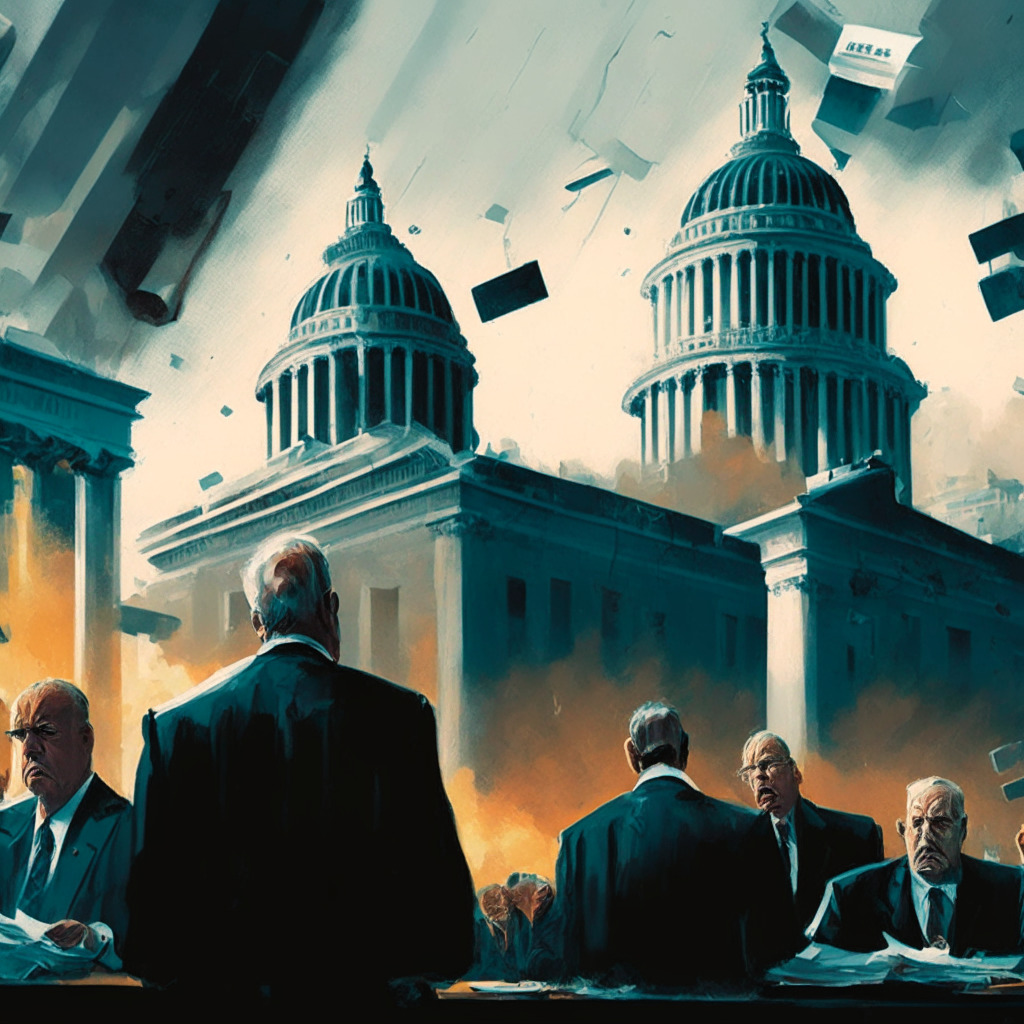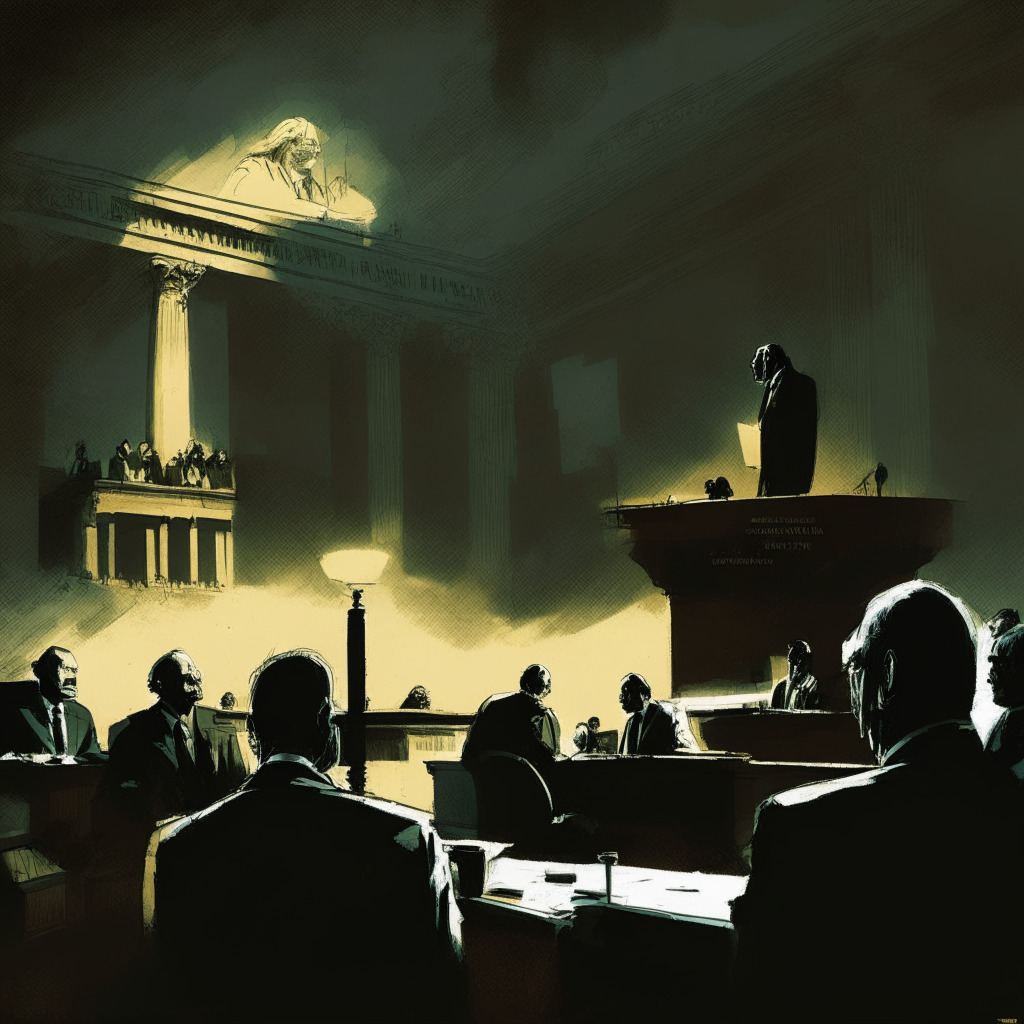Barney Frank blamed industry outsiders for Signature Bank’s collapse, arguing their crypto dealings were “safe and sound” prior to regulators stepping in. Public confusion and “crypto-fear inaccurate withdrawals” contributed to the institution’s failure, highlighting the importance of educating the public to avoid future crises in the crypto industry.
Search Results for: Silicon
2024 US Election and Crypto: Regulation vs Innovation Showdown
The US cryptocurrency regulatory stance becomes a significant topic as the 2024 presidential election approaches, with figures like Florida Governor Ron DeSantis discussing the possibility of banning CBDC use in Florida. The current administration’s enforcement actions, ongoing lawsuits, and heavy regulation could hinder innovation and force businesses to seek more open environments outside the US.
DAI’s Shifting Collateral Mix: Decreased USDC Backing and Future Decentralization Prospects
MakerDAO’s DAI stablecoin has reduced its USDC backing from 50% to 23.6%, increasing diversification in its backing assets. As dependency on USDC decreases, DAI’s backing now includes more significant real-world assets, such as U.S. government bonds and stablecoins like GUSD and USDP.
Bali Warns Tourists: Crypto Payments May Lead to Deportation or Sanctions
Bali Governor Wayan Koster warns foreign tourists against using crypto for payments, stating violations can lead to criminal penalties, deportation, or sanctions. Indonesian law requires transactions to utilize local currency, the rupiah, to protect it from alternative currency challenges.
Pony.ai’s Robotaxi Expansion: China’s Race to Autonomous Vehicle Dominance & Its Implications
Chinese autonomous vehicle startup Pony.ai has expanded its driverless robotaxi services with a newly introduced service in Shenzhen. Backed by Toyota Motor and NIO Capital, Pony.ai faces competition from Baidu and Didi Chuxing in the fast-paced Chinese market. The government aims for vehicles with partial self-driving technology to account for 50% of all new-auto sales by 2025.
Stablecoin Market Shifts: USDT Reigns Supreme as USDC Fumbles with Regulation
The market dominance of stablecoins has shifted, with Tether’s USDT hitting an all-time high and Circle’s USDC experiencing a downturn. Increased transparency is emphasized for stablecoin reserves, while Tether and Circle reduce banking exposure amid economic uncertainty and increase US Treasury holdings.
Beijing’s Web3 Push: Balancing Innovation, Regulation, and Crypto Industry Growth
Beijing Municipal Science and Technology Commission’s “Web3 Innovation and Development White Paper” aims to establish Beijing as a global innovation hub with CNY100m annual funding until 2025. Despite China’s cryptocurrency ban, this move hints at opening up to the industry and growing Web3 alongside Hong Kong’s upcoming cryptocurrency regulations.
Worldcoin: A Questionable Vision of Crypto UBI and Biometric Data Dilemmas
Worldcoin, a project raising $115 million, intends to distribute its tokens as “universal basic income” using retina scanning via The Orb device. However, it faces skepticism due to privacy risks, ethical concerns, deceptive marketing practices, and potential GDPR violations.
US Banking Crisis: Crypto Downturn & Big Returns for Risk-Takers, Weighing Pros & Cons
The recent US regional banking crisis highlights the disparity between major Wall Street banks and smaller institutions, affecting US banking stocks. Investor Michael Burry purchased shares in beleaguered banks, and amidst market uncertainty, the crypto market experiences a downturn.
Fed’s Actions and Crypto Market: How Jerome Powell’s Remarks Impact BTC and Central Banks
Amid mixed crypto market expectations, US Fed Chairman Jerome Powell discussed the US banking system’s strength and resilience to support liquidity without compromising monetary policy. Investors must stay vigilant as decisions made by the Fed and central banks’ involvement in cryptocurrency could impact market sentiment and regulations.
Failed Banks Blame Crypto: Is it Deflection or Legitimate Concern?
US Senators criticize executives of failed banks for deflecting responsibility for poor management onto digital asset firms. Senator Lummis highlights divergence in perspectives on digital assets’ role in recent bank failures. Transparency and accountability in banks dealing with digital assets are essential in building trust and adapting to the rapidly changing landscape.
Collapse of Signature Bank: Crypto Scapegoat or Executive Greed? Debating the True Culprit
Former Signature Bank chairman Scott Shay faces criticism for blaming the cryptocurrency industry for the bank’s collapse, while potentially collecting millions in bonuses and stock options. Senators Warren and Lummis argue that current laws allow executives like Shay to recklessly crash banks, jeopardizing the economy, and demand clawbacks of “crazy paychecks.” Blockchain understanding remains crucial amidst evolving digital asset complexities.
Did Crypto Cause Signature Bank’s Collapse? Debating Reasons and Regulator’s Intentions
Two executives from the defunct Signature Bank testified before Congress, asserting that the bank could have recovered despite customer withdrawals of $16 billion. Questions about the role of crypto in the bank’s shutdown remain unanswered, with regulators denying that it was related to crypto exposure.
Bank Failures: Are Digital Assets the Culprits or Scapegoats? Debating Responsibility and Regulations
This excerpt raises questions about the impact of digital assets on traditional banking institutions and whether it’s fair to blame cryptocurrencies for bank failures. It emphasizes the importance of collaboration between stakeholders, regulators, and the banking sector to ensure a well-regulated environment fostering growth and stability in both traditional banking and cryptography sectors.
Banking Crisis Fears Boost Crypto Markets: Balancing Innovation and Financial Security
Amid the potential US regional banking crisis, the uncertainty in the banking sector has proven to be bullish for Bitcoin prices. The rise of cryptocurrencies and decentralized finance offers potential solutions to traditional banking challenges during times of economic uncertainty while also prompting concerns and striking a balance between innovation and security.
Collapse of Signature Bank: Crypto Exposure, Regulation, and Lessons for the Future
The collapse of Signature Bank highlights the potential systemic risks posed by crypto-linked banking activities and the importance of stringent regulatory oversight. It serves as a cautionary tale about unchecked growth, inadequate risk management, and the need for proper risk management practices in the volatile and rapidly evolving crypto industry.
FDIC Blames Crypto for Bank Collapses: Analyzing Risk Factors and Future Implications
The FDIC chair, Martin Gruenberg, attributes non-compliance with risk controls, poor governance, and dependence on uninsured crypto deposits to the collapse of crypto-friendly banks like Signature Bank and Silicon Valley Bank. While cryptocurrencies played a part, sound governance and responsible investments are essential for financial stability.
Auradine’s $81M Series A Funding: Impact on Blockchain Security, AI & Privacy Debate
Privacy-focused blockchain startup Auradine raised $81 million in Series A funding led by Celesta Capital and Mayfield, with participation from Stanford University and Marathon Digital Holdings. Auradine aims to develop scalable, sustainable, and secure solutions in the fast-evolving blockchain technology sector.
Auradine Secures $81M Series A Funding: AI, Blockchain and Privacy Technologies’ Potential Impact
Auradine, a Silicon Valley-based web infrastructure provider, has raised $81 million in a Series A funding round, aiming to develop hardware, software, energy-efficient silicon, and AI solutions for decentralized applications. Backers include Marathon Digital Holdings, Celesta Capital, and Mayfield.
Crypto Bank Runs: The Role of Whales and Risky Investments in Market Turmoil
A recent study found that the 2022 crypto bank runs were majorly triggered by whale account holders withdrawing large portions of their funds. Crypto platforms’ run risks arose from allowing unrestricted withdrawals while using funds for risky, illiquid investments, highlighting policy concerns.
Signature Bank Collapse: Crypto Exposure’s Role and Lessons for Future Regulations
FDIC Chairman Martin J. Gruenberg suggests that the failure of Signature Bank may be partly due to its inability to comprehend risks tied to cryptocurrencies and inadequate management. While the direct impact of crypto exposure on the bank’s collapse remains unclear, it highlights the need for closer scrutiny on crypto market regulations.
BlockFi Bankruptcy: Creditors Blame Management, Not FTX, for Company’s Downfall
The BlockFi Creditors Committee disputes BlockFi’s claim of being a victim of FTX and Alameda, blaming poor management decisions for the company’s downfall. They highlight a series of financial losses, potential tax complications for customers, and mishandling of customer funds. Despite recent rulings, BlockFi’s future depends on claims against Alameda and FTX.
Crypto Bank Closures: Striking a Balance Between Regulation and Innovation
Signature Bank reduced digital asset deposits due to increased volatility and regulatory concerns, according to former chairman Scott Shay. The collapse of three crypto-focused banks in March impacted the crypto industry, raising questions on whether regulatory intervention and banks’ decisions are necessary for financial stability or inadvertently stifle the growth of the crypto and blockchain industry.
Michael Burry’s Strategic Moves in Distressed US Banks and Crypto: Opportunities or Risks?
Michael Burry, the “Big Short” investor, strategically acquires shares in distressed banks, boosting confidence in banking stocks. Despite crises and valuation slumps, Burry’s investments tackle different avenues within the banking ecosystem, while also exploring the digital currency space. Market research is crucial for investment decisions.
Bitcoin’s Rising Status as Safe Haven Asset Amid US Debt Ceiling Crisis
A recent Bloomberg Markets Live Pulse survey suggests Bitcoin could be considered a safe haven asset, surpassing traditional options like the yen, franc, or U.S. dollar, amid concerns over the U.S. debt ceiling. The survey highlights a growing interest in digital currencies as an alternative means of asset protection, showcasing their potential in the financial future.
Gold vs Bitcoin: Unraveling the Divergence and Future Implications for Investors
Gold’s steady ascent, outperforming Bitcoin, raises questions about potential causes of this discrepancy – market sentiment, regulation, volatility, and environmental concerns. Understanding these factors is essential, but the future trajectory of both assets remains uncertain.
Bank Deposits Decline: Crypto’s Surge or Inflation’s Crippling Effects?
US bank deposits are nearing $17 trillion, possibly signaling a shift towards cryptocurrencies like Bitcoin. Factors like bank failures, inflation concerns, and increased interest rates contribute to this decline, driving investors to explore alternative investment opportunities such as crypto. However, caution and thorough research are necessary before committing to cryptocurrency investments.
US Losing Stablecoin Dominance: USDC’s Struggle and the Rise of Tether Threatens Digital Economy
The US may be losing ground in the digital economy as USD Coin (USDC) faces strong competition from Tether (USDT). This shift could undermine US control and expose the Web3 community to less-regulated forces. Policymakers must prioritize Web3 and stablecoins to ensure America’s influence in the digital economy.
Binance Liquidity Decline Triggers Bitcoin Volatility: Impact of US Banking Failures and Promotions
Binance experienced a decline in trading volumes and liquidity in Q1 2023 due to U.S. banking failures and termination of its zero-fee promotion. This resulted in increased Bitcoin price volatility and a sharp drop in monthly trading volumes for the BTC-USDT pair.
Miami’s Cooling Crypto Enthusiasm: A Reality Check or Missed Opportunities?
Amid a bearish crypto market, Miami and Mayor Francis Suarez appear to be losing enthusiasm for cryptocurrencies and blockchain technology. Once aiming to make Miami a leading crypto hub, recent events like the MiamiCoin trading halt, FTX Arena renaming, and Blockchain.com canceling its office relocation reflect a shift in the city’s crypto landscape.
Balancing Bank Regulations: Can Overregulation Hinder Progress and Create a False Security?
JPMorgan Chase CEO Jamie Dimon highlights potential troubles for U.S. banks due to overregulation and its obstructive impact on business practices. Emphasizing the need for a more holistic approach to regulations, Dimon suggests that solely relying on stress tests and overregulation may create a false sense of security and detract from addressing crucial vulnerabilities in the banking industry.
2023 Crypto Crackdown: Operation Choke Point 2.0 vs Banking Industry Collapse
The US regulators’ crackdown on the crypto market has led to the closure of Silvergate, Silicon Valley Bank, and Signature, while prominent figures criticize scapegoating cryptocurrencies for the banking crisis. The House Financial Services Committee investigates potential coordinated efforts to de-bank the crypto market as the banking crisis worsens.































